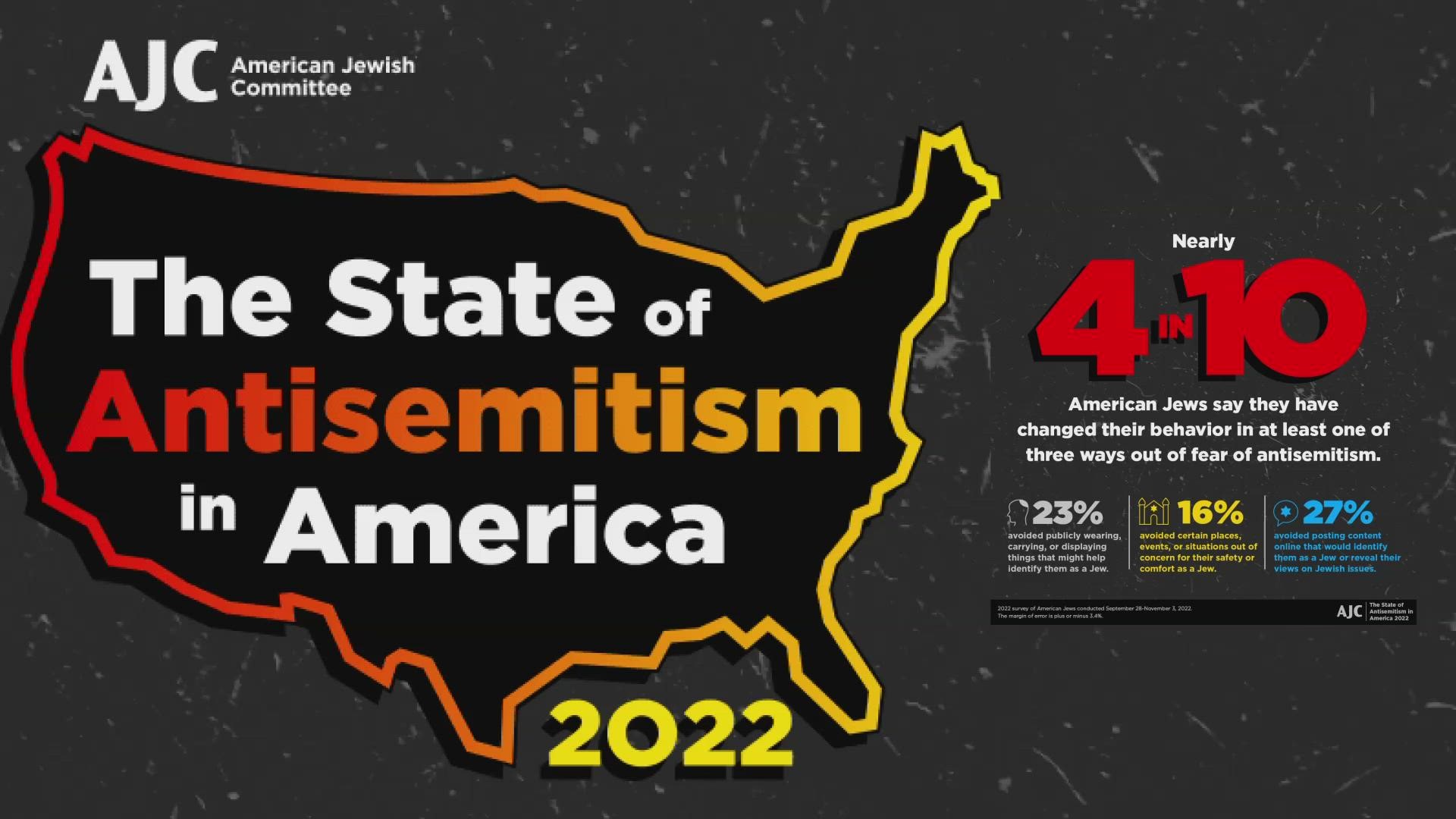ST. LOUIS, Missouri — More than four in 10 Jews in the United States feel their status in America is less secure than it was a year earlier, according to a new survey by the American Jewish Committee (AJC).
The survey, conducted in the fall of 2022, was released Monday by the AJC, a prominent Jewish advocacy organization.
The survey was taken in a year of high-profile incidents of antisemitism, including a hostage-taking at a Texas synagogue and anti-Jewish statements shared by celebrities on social media.
Former President Donald Trump dined with two openly antisemitic guests, drawing criticism from his own Jewish supporters.
The study found 20% of American Jews surveyed were the target of an antisemitic remark in person and found 87% experienced racist or hateful comments online. The survey found nearly four in ten American Jews altered their behavior or hid their identity to avoid being targeted, and just 3% of Americans in the general public who saw cases of antisemitism online reported it to the social media platform.
"Definitely I think twice before posting something on social media," Nancy Lisker, the regional director of the AJC, said. "Jews feel that antisemitism has been normalized."
More than four in five people who participated in the survey said when they witnessed antisemitism, it was online.
Often, a lack of awareness can lead to antisemitic images spreading rapidly online, according to Helen Turner, the director of education at the St. Louis Holocaust Museum.
"That's actually a huge piece of what we teach here in the museum," Turner said. "We have a whole propaganda wall that really explains how images, how tropes, how all these different stereotypes can be manipulated. And now we see them appearing as memes or GIFs and how people share them without thinking."
Turner said many people fall into the trap of mindlessly sharing something without knowing the darker history behind it.
"It might seem like a joke, or it might seem like a mindless share," she said. "It's not. It has ramifications and it's leading to a bigger feeling."
Experts recommend taking time to visit a Holocaust Museum, become more familiar with the insidious effects of hateful imagery, so you can spot it when someone shares it in your social media feed.
If you see something questionable or offensive, experts suggest flagging it or reporting it.
According to the AJC survey, 41% of the respondents said the status of Jews in the U.S. is less secure than it was the year before, while 55% said it was the same. Only 4% thought it was more secure.
The results show anxieties increasing since a comparable survey in 2021, when 31% of respondents thought their status was less secure than a year earlier.
Four in five Jews said in the 2022 survey that antisemitism has grown in the past five years; nearly half said it’s taken less seriously than other forms of bigotry or hate.
A quarter of the respondents said they were directly targeted by antisemitic expressions, either in person or on social media, with 3% reporting a physical attack. Nearly four in 10 changed their behavior to lower risks to their safety.
Similarly, nearly four in 10 reported avoiding visible expressions of Jewishness in public, such as wearing a skullcap. Smaller percentages reported taking similar steps on campus or at work.
Other findings:
—Nearly 90% of U.S. Jews — and the same percentage of the country's total population — believe antisemitism is a serious problem, up from 73% in 2016.
—Of the Jews surveyed in 2022, 63% said that they see law enforcement as appropriately responsive when it comes to antisemitism, a substantial drop from 2019 when that number was 81%.
The survey collected data from a nationally representative sample of 1,507 adults of Jewish religion or background. It was conducted from Sept. 28 through Nov. 3.
News of antisemitic incidents surfaces almost daily in the U.S. Earlier this month, for example, numerous antisemitic flyers were distributed in suburban Atlanta, including at the home of Georgia’s only Jewish state legislator.
Rep. Esther Panitch, a freshman Democrat, denounced the flyers from the floor of the House of Representatives, with dozens of colleagues surrounding her to show solidarity.
“This weekend, it was my turn to be targeted,” Panitch said. “Unfortunately, it’s not the first time to be afraid as a Jew in the United States.”
On Thursday, Doug Emhoff, the husband of Vice President Kamala Harris, took his campaign against antisemitism to the United Nations, urging diplomats from many nations to speak out against the rising global hatred of Jews and stressing: “Silence is not an option.”
Emhoff pointed to celebrity comedians too often using antisemitism “to draw cheap laughs, high profile entertainers and politicians openly spouting tired antisemitic tropes (and) others making comments laced with not-so-subtle innuendo.”
Among the most dramatic antisemitic incidents in 2022 was the January hostage standoff at Congregation Beth Israel synagogue in Colleyville, Texas, a suburb of Fort Worth.
A pistol-wielding British man took four people at the synagogue hostage and held them for 10 hours before they escaped, and the captor was killed by the FBI.
___
Associated Press religion coverage receives support through the AP’s collaboration with The Conversation US, with funding from Lilly Endowment Inc. The AP is solely responsible for this content.

